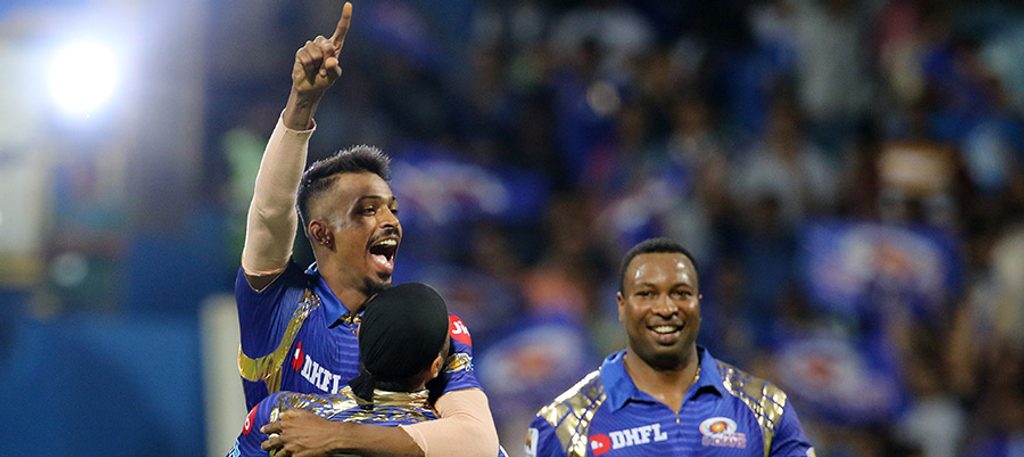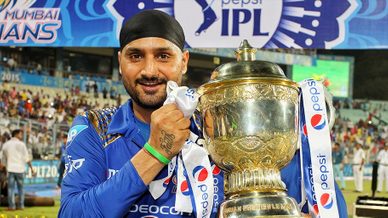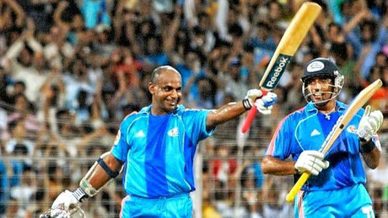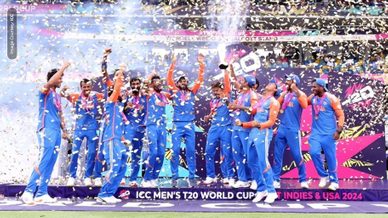
MI’s stunning sixth
Here’s the situation: A team loses the toss and is put into bat at the Wankhede. After batting first it manages a total nearly 30 below the par (in the preceding 5 matches). To top it all, it is up against an explosive batting line-up. What happens?
Answer: Well, if you’re the Mumbai Indians, you win.
Despite the best efforts of Kagiso Rabada and Chris Morris with both bat and ball, the Mumbai Indians managed to prevail over a gutsy Delhi Daredevils to register their 6th successive victory in the Indian Premier League, 2017. Zaheer Khan called correctly at the toss and had no hesitation in putting Mumbai Indians in to bat. There’s no doubt Delhi were swayed by recent history which has favoured the chasing team 7 successive times at the Wankhede since IPL 2016. This would be the first time this season where we would be batting first at our fortress and Buttler and Parthiv walked in, in the hopes of replicating some of the magic from the night in Indore a couple of days back.
Things began well for the home side, courtesy some wayward bowling from debutant Kagiso Rabada with 8 runs on the board after the first over. Buttler was fortunate to score a maximum off Morris’ first over with a top edge sailing over the ropes and rode his luck the next ball, getting an outside edge for a boundary. With Zaheer coming on to replace Rabada, the expectation was that runs would dry up, but the senior spearhead was uncharacteristically untidy in his first over, leaking 9 runs.
Rabada changed ends and it immediately brought about a dismissal, with the young South African landing a pinpoint perfect yorker that obliterated Parthiv’s stumps. Despite this setback, Mumbai were cruising along at more than 9 runs an over and looking good to post a total that would be negate the win-toss-bat-first advantage inherent at the Wankhede. Buttler continued on his merry way, cashing in on Zaheer’s lack of accuracy with a pair of fours: one a tickle down leg, the other a chip over the infield over cover for four.
Chris Morris’ second over started with a quick single attempted by Buttler, with the gamble not paying off as Sanju Samson running out the dangerous Buttler for a well-made 28 off 18 balls. Undoubtedly, Rishabh Pant would have been a relieved man, having dropped the Englishman on 11. Mumbai ended the powerplay on 48/2 with Delhi carrying momentum into the middle overs.
Amit Mishra was brought into the attack immediately and immediately found turn. The move was a shrewd one by Zaheer, with new batsman Rohit Sharma having struggled against quality spin this season. Despite this, Mishra’s first over was played out sensibly, with a boundary off the fourth ball (a Rana reverse sweep) being a bonus. Aussie quick Pat Cummins was brought into the attack the next over and again, Zaheer’s bowling change paid dividends. An innocuous back-of-the-length ball hurried onto Rana, who pulled it straight down the throat Corey Anderson at deep midwicket. Suddenly Mumbai were 56/3 in the 8th over and had lost their most prolific batsman of the season and all momentum.
Kieron Pollard walked in at 5, having survived (and thrived) in a similar situation against Royal Challengers Bangalore, earlier this season. However, before Pollard and Rohit could shore up the innings, Rohit fell victim to spin yet again as he slog-swept Mishra to Pat Cummins, who took a smart catch running in from the boundary. It would fall on the shoulders of both KPs (Krunal Pandya & Kieron Pollard) to consolidate and provide impetus to this innings.
There would be no repeat of their partnership against RCB this night, however. Mishra, bowling brilliantly with guile, drift and dip got the googly to rip past Krunal’s hanging bat where Rishabh Pant took a good, sharp, catch behind the stumps. Krunal departed for a fluent 17 off 16 and Mumbai slid further into trouble at 84/5. Kieron Pollard was 4 off 13, but Pollard slammed a loose Mishra ball for a boundary past the leggie. It still didn’t spoil the night for Mishra as he took the otherworldly figures of 1/18 off his quota of 4 overs.
Patrick Cummins was again brought into the attack, with the first ball of the 16th over being dispatched to Morris at backward square leg: unfortunately for Morris and Delhi, a rare lapse in the field ensued and he completely misjudged the trajectory of the ball, letting through a crucial boundary. Pollard was finally striking at a-run-a-ball. Krunal continues the trend of a boundary off the first ball of an over, with a beautiful pick-up shot off Chris Morris for six. At the end of the 17th over, Mumbai were 120/5 and were looking to target 30 runs off the final 3 overs.
Patrick Cummins had other ideas, though. The first ball of the 18th over was a cutter, which Pollard, even with all his might, could not clear Sanju Samson running in from long-off. The final five balls of the over could only yield 3 runs as Mumbai slid to 123/6 after 18 overs, with Cummins returning the fantastic figures of 2/20 off his 4 overs. The final two overs of Mumbai’s innings were a textbook lesson in death bowling by the South African duo of Kagiso Rabada (who bowled the penultimate over) and Morris (who bowled the last over). Despite going for 19 runs off the two overs, the duo managed to restrict Mumbai to 142 and it was clear that the Daredevils were the happier of the two sides coming into the innings break.
A total of 142 is under-par, given that the average score batting first in the last five matches before today’s was in excess of 170. Something special was required from our quicks to keep the team in the hunt, but not even the most fervent supporter would have dreamt up the mayhem that ensued in the first 6 overs. It was up to the two Mitchells (Johnson and McClenaghan) to come up with the goods up-front. Interestingly, it was Hardik Pandya who effected the first dismissal, who echoed Samson’s run out of Buttler in the first innings with an absolutely brilliant piece of fielding. Hardik swooped in from extra cover and in one fluid motion dived, picked up and released the ball, with his underarm throw finding Aditya Tare short of his ground. Delhi were 1/1 and on the backfoot straight away.
Four balls later, Delhi found themselves two-down, with the pitch playing a role this time. Mitchell McClenaghan got Sanju Samson to play a checked drive straight to the gleeful Rohit Sharma at mid-off. Shreyas Iyer walked in at four, familiar with the ground, given that he plays for Mumbai in the Ranji Trophy. He was confidence personified, with a delicate glance off McClenaghan opening his account and despite Delhi losing two wickets, they kept the scoreboard ticking over.
The third over of the innings set up the carnage that was to ensue in the fourth over as only 5 runs were eked out. McClenaghan returned for his second over and was lucky to get his second wicket of the day, when Iyer tickled a leg-side delivery straight to Parthiv behind the stumps. Corey Anderson walked in, facing his compatriot in the cauldron-like atmosphere as the faithful were sensing something special was going on. After 2 dots and a wide, McClenaghan speared in a full ball that evaded Anderson’s bat and he was adjudged LBW. Delhi had slumped to 21/4 and Mitchell McClenaghan was simply irresistable, having picked up all 3 wickets to have fallen to bowlers at that point.
Mitchell Johnson provided the perfect foil for the Kiwi, bowling the second maiden of the match, with Karun Nair unable to get to the other end of the pitch. Jasprit Bumrah was brought on to round out the powerplay and struck in his first over, with a short ball angled into the right-hander, who could do nothing else but guide it to Harbhajan Singh at slip. It also meant that for the second successive match, Pant departed without troubling the scorers. Bumrah’s first over went for just 2 runs and Delhi were 23/5 after the powerplay ended, with debutant Kagiso Rabada batting in the powerplay at number 7.
Rohit decided to bring on Hardik Pandya immediately after the powerplay ended and his hunch was justified as Pandya, fortuitously, got Karun Nair to chop on a harmless length ball onto his stumps. That brought in Rabada’s compatriot, Chris Morris, at number 8, with all preceding 6 batsmen having been dismissed for single figures.
Rabada and Morris combined brilliantly for Delhi, with the pace-bowling duo stitching the only 50-run stand of the match. Harbhajan Singh was brought on in the 8th over to take pace off the ball, with the duo content to nudge the ball around the outfield, although there was an element of luck, as Rabada edged Harbhajan off his last ball for four. The next three overs proved to be annoying for Rohit Sharma and the Mumbi Indians as a combination of luck and sensible batting saw the duo put on 33 runs, nearly what Delhi had managed in their first 6 overs.
Rabada, who before today had managed just 16 runs in his T20 career (to go with a top score of 8*), was now on 31 off 17 balls, ably supported by Morris on 12 off 14 balls. Delhi were 69/6 and suddenly the target of 143 wasn’t looking preposterously out of reach. Harbhajan Singh pulled things back in the 12th over as only 2 runs were scored off it: off the first couple of balls. Rohit Sharma opted to draft Mitchell Johnson for his final over of the day, but Morris’ timing was in evidence as he crashed a wide ball for four behind point. Johnson finished his spell with a dot to register the economical figures of 0/23 off 4 overs.
Harbhajan Singh bowled out at the other end and his wait on 199 T20 wickets continued as he failed to prise out the stubborn Saffer duo. The required run rate touched double figures as 60 runs were required off the final 6 overs and the game was again in the balance, having seemed in Mumbai’s pocket just a few overs previously.
The pressure was building for both sides when Krunal Pandya was brought on in the 15th over. Morris was fortunate to land a boundary, after Kieron Pollard failed to keep his spikes off the boundary cushioning after having pulled off a spectacular diving stop. Pandya’s over cost 8 runs as Delhi moved on to 91/6 with the required rate still firmly in double digits. Rohit Sharma brought back on the man of the moment, Mitchell McClenaghan, with the burly Kiwi continuing on from where he left off initially, conceding just 6 runs. Bumrah followed that up with an excellent 17th over with his trademark yorker making a welcome appearance: just 4 runs eventuated as Delhi brought up their 100. The pair also rewrote history, now having put on the most runs by a Delhi pair for the 7th wicket.
The heat was on for both sides and it boiled down to who blinked first as McClenaghan finished his spell in the 18th over. With 5 runs off the first 6 balls, Chris Morris responded brilliantly and deposited a length ball way over midwicket for a six, just the second of the innings. The equation now read 30 runs, 12 balls, two set batsmen, with Mumbai’s destroyer-in-chief having just bowled out.
One felt that this was the key over. The over in which the match would be decided. Jasprit Bumrah was to bowl out, how would he respond? Brilliantly, as it turned out. Simply put, he conceded 5 runs, but more importantly ended a record-breaking 7th wicket stand. With every MI fan cheering on Bumrah, he landed a perfect leg-stump yorker off his 4th delivery to end a fine debut innings by Kagiso Rabada. His 44 pesky runs came off 39 balls and contained 4 hits to the hence, one beyond it.
In the end, 25 runs were required off the final over bowled by Hardik Pandya. Given that he successfully defended fewer than half that at the World T20 last year against Bangladesh, Mumbai were the odds-on favourite to clinch this. And they did. Despite a wide and a four, Mumbai emerged victorious by 14 runs. What was lost in all the joy surrounding the hard-earned victory was Morris’ 50. A match featuring a fifty by a number 8 is unusual, a match in which it was the top score is truly rare. The innings was a wonderful example of the vagaries of the IPL (and T20 cricket in general). The night belonged to Mumbai, however, and we are yet to lose at the Wankhede this season, amongst other statistical milestones.
We will face Rising Pune Supergiant, with some unfinished business to take care of. Our current win-streak is our joint-best in the IPL and a win against RPS will ensure we complete the set of winning against all 7 teams this season. Till then, we can enjoy a 4-point buffer at the top of the table, with our ambition of qualifying for the business end of the tournament well and truly in sight.
Stats: –
⦁ Before his 44 today, Rabada managed 16 runs in all T20 cricket, with a top score of 8*
⦁ The 142 defended today is the lowest successfully defended total in IPL 2017
⦁ Mumbai are now on a 6-match win streak, their joint-longest in the IPL, mirroring their streak in 2008.
⦁ Mumbai’s victory also snapped a 7-match losing streak for teams who have batted first at the Wankhede in the IPL.
⦁ Hardik Pandya is yet to be dismissed by a bowler this IPL. His batting average currently is 120.00 and his strike rate is 190.47.





